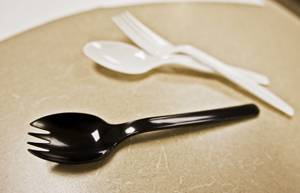OPOIEN: The utensil choice of the future

Sporks can be a wonderful utensil choice to help the enivronment. Photo: Manfred Strait/Iowa State Daily
October 14, 2008
What’s your favorite utensil? Maybe you’ve never considered the answer to that question. Kudos to those of you who have. Utensils — flatware, to be specific — may not sound like something worth pondering. However, the contrary is true. I encourage all of you — whether you are a diehard spoon fan, ambivalent, or apathetic toward flatware — to consider the spork.
What is a spork, you ask? If you have eaten at KFC or Taco Bell, chances are you’ve encountered this wondrous creation. A spork is defined by Random House Webster’s Unabridged Dictionary as an “eating utensil combining features of a spoon and a fork.” The word “spork” is sometimes used interchangeably with “runcible spoon,” however Merriam-Webster defines the runcible spoon as a sharp-edged fork with three broad curved prongs. In general, the difference probably isn’t worth disputing, but I’ve made it known in the interest of full disclosure.
A brief history of sporks: Spoons, developed by early humans, were commonly fashioned from wood by the fifth century. Forks took longer to catch on — they weren’t widely available until the 16th century, although an early form of the fork can be traced to the ancient Greeks.
Then one fine day, the spoon met the fork.
Their beautiful lovechild came to be known as the spork. There is an abundance of conflicting information as to when the spork – both the utensil and the term — was patented, but it is widely accepted that various incarnations of sporks have been in production since the late 1800s.
What are the benefits of sporks? The possibilities are endless — there are undoubtedly more advantages the ones listed here.
Let’s start with the spork’s potential impact on the environment. Envision this scenario: You’ve just eaten take-out for dinner from a restaurant that has supplied you with a plastic fork, spoon, and knife. Sadly, your local recycling facility doesn’t accept plastic flatware, so you throw away all three utensils. Now let’s think about what a spork could do for this calamity. You’re done with your meal and it’s time to dispose of the utensils — but instead of three articles of waste being discarded, this time there are only two!
Of course it would be optimal to eliminate all plastic waste; however this is not yet a feasible solution. Some restaurants and cafeterias are beginning to use biodegradable flatware (often made from starches like potatoes), but the practice is still relatively expensive and is not yet widespread. While plastic flatware is still being used, why not cut down on waste by replacing forks and spoons with one handy utensil?
While we’re talking sporks, why limit ourselves to the plastic variety? Oh yes, it’s true – sporks exist in other forms. Looking for a classy spork for the dinner table? Try stainless steel. Going camping? Consider investing in a titanium spork.
Going camping with a spork? Sounds silly, doesn’t it? Not when you think it through. A titanium spork is durable and lightweight — and your flatware needs can’t get any more compact than a spork! Well, unless you get a Splayd, but that’s an entirely different story.
What else can sporks do for our planet? Am I the only one who recalls watching Jerry Nelson sing a little song called “Don’t Waste Water” on Sesame Street? Since hearing that inspirational tune at the tender age of three, I have done my best to follow those instructions. What does this have to do with sporks? Imagine the water we could conserve by washing one spork for every fork and spoon pair!
If the environmental arguments haven’t convinced you, we can evaluate the spork in terms of convenience. Prior to writing this column, I obtained some sporks from the Taco Bell on Lincoln Way. I brought these sporks to the Union Drive Marketplace and used a spork to eat every meal for a week. The convenience of the spork surpassed my expectations. Cereal, pasta, stir fry, even salads — everything could be eaten with one glorious utensil. When done properly, a spork can even pierce a cherry tomato without spraying juice everywhere. Impossible, you say? Give it a try!
The splendor of the spork is impossible to deny. Its fusion of spoon and fork can be a uniting force for our increasingly divided society. As former President Bill Clinton said at the March 1995 Radio and Television Correspondents Dinner, “This is a cross between a spoon and a fork. No more false choice between the left utensil and the right utensil. This is not an ideological choice. This is a choice in the middle and a choice for the future. This is a big, new idea — the spork.”
The next time you are presented with a choice of utensils, I encourage you to give the spork a chance. I think you will find it spork-tacular.
— Jessica Opoien is a freshman in English from Marinette, Wis.
















